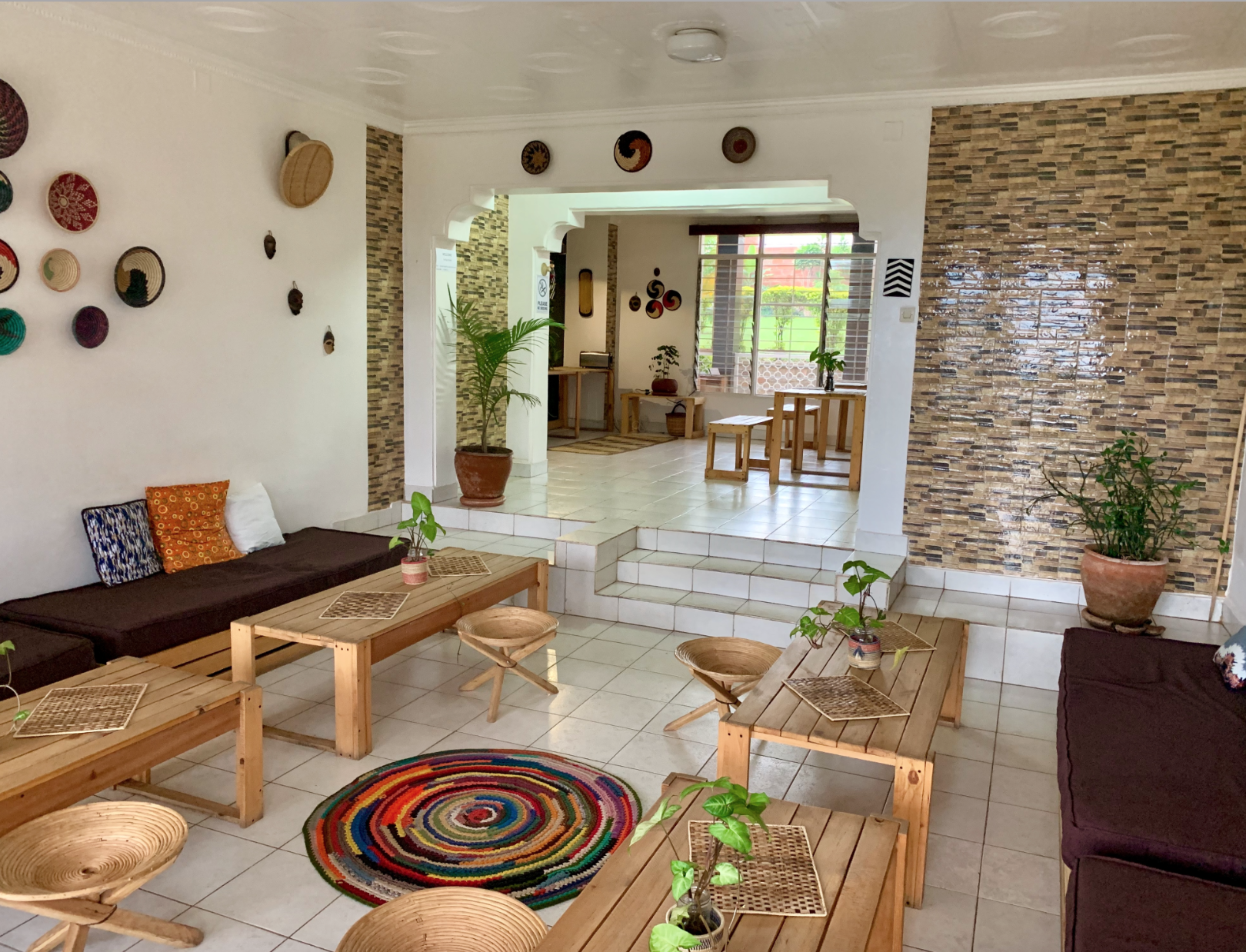
Featured image: The common area of our hostel, featuring many woven pieces of furniture and baskets as wall décor.
By Grace Chen
Our first morning in Kigali is an early one. The first of our cohort to arrive, we had landed just before midnight to greet Rwanda’s dark, but still humid, evening sky after stumbling groggily through Passport Control, bones still stiff and muscles still aching from the yoga routine of shifting from one sleeping position to another over the course of our 21-hour journey. While we found ourselves briefly enraptured by the modest night lights of the city flashing by during our short drive from the airport, they did not awaken us enough to prevent us from falling swiftly back into slumber upon arriving to the hostel we would call home for the coming week.
Perhaps it was too ambitious of an itinerary for Day One. Eager to take advantage of a full day before the rest of the team arrived, I had scheduled a meeting with a student at the new campus of the University of Global Health Equity in rural Burera District, three hours north from where we were staying. But now, the hours until my appointment slowly shrinking away and the private driver we had confirmed the night before still nowhere to be seen, I begin to doubt whether we would get there at all. A meticulous planner, taking after my dad, I can feel the first itches of anxiety creeping in as we scramble to make sense of the transportation procedures from Nyabugogo Bus Terminal, for which we find scarce information online.
Our research is interrupted by our host announcing that breakfast is ready, and we eagerly move to examine the selection: our first meal in the country.
“What’s that?” one of my colleagues asks, pointing to a bowl of dark, ovular fruits slightly bigger than golf balls, some of which show a whisper of purple on their smooth, undimpled skins.
“Passion fruit!” the host exclaims, immediately selecting one for a demonstration. A simple slice around its equator reveals a pocket rich with golden sacs of pulp that envelop what must be at least fifty dark seeds. The last time I can recall the taste of passion fruit was during a family vacation to Hawaii two summers ago, but then it was entwined with the flavors of orange and guava in the popular drink “POG.” I had been unaware of the aesthetics of the fruit that now fail to impress me at first—the pulp reminds me of fish eggs—but I reserve final judgement for later.
“Just use a spoon,” the host instructs us.
The explosion of flavor is at once sweet and sour, and the seeds offer a satisfying crunch; we gush, scrape the shell clean in just a couple of spoonfuls, and reach for more.

Our meal at the University of Global Health Equity, which included passion fruit and ginger tea.
Throughout the rest of the trip, we enjoy steaming samosas filled with lentils and other savory legumes, green sombe made from cassava that we mix with rice, and white sweet potatoes that are speckled like dragon fruit. When we do make it to the University of Global Health Equity after all, my colleague hazards a try at ginger tea, which turns out to be so spicy that he cannot finish his cup despite being told it is good for his gut. The “chips” we would refer to as French fries back in the United States are served with mayonnaise instead of ketchup, and we probably quadruple our hostel’s weekly passion fruit budget during the course of our stay.
The host shows us their avocado tree in the backyard, telling us that they know the fruits are all ripe when the first one falls. Out front, he shows us their guava tree and helps us select pale green ones to bite fearlessly into, breaking apart the tough, bitter shell to reveal the pink flesh inside.
For the first time, I appreciate with each and every one of my senses the life cycle of my food, from seed to fruit. In Rwanda, it is impossible to be blind to agriculture—it is everywhere, from the traditional dishes that were heaped on our plates in school cafeterias, to the farmers we passed on terraced hills as we pursued the peak of Mount Bisoke, to the backyard of our own hostel.
Grace Chen is a junior in Berkeley College. You can contact her at grace.chen@yale.edu.